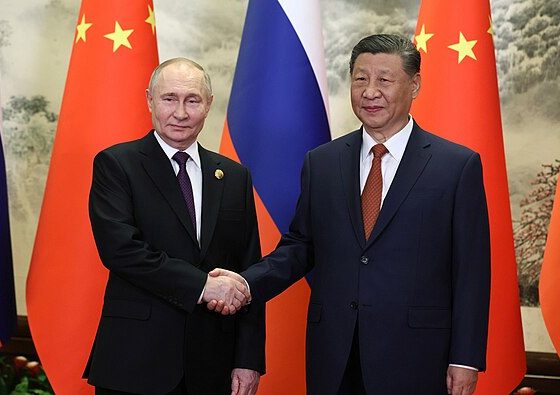There’s a lot to unpack in Erik Prince’s sprawling 4,600-word May 2 opinion piece in the Daily Caller entitled, “Neocons Almost Killed America. Here’s How Patriots Can Fix It.”–so much so that it required two responses to adequately discuss. Part one discussed Prince’s largely correct critique of America’s post-Cold War foreign policy failures and the Pentagon’s myriad inefficiencies. Part 2 looks at Prince’s contention that U.S. foreign-policy missteps pushed Russia into China’s arms.
Unfortunately, while Prince makes some good points with his analysis of America’s hyper-interventionist foreign policy since the collapse of the Soviet Union, he goes on to engage in a bit of wishful thinking reminiscent of the foreign policy “experts” he criticized by claiming that “… the opportunity to positively engage with Russia after 1991 was rejected by the dominant neoconservative faction and their military-industrial complex allies in Washington.”
Prince claims that NATO’s post-Cold War expansion drove Russia away. This betrays a fundamental misunderstanding of Russian history and culture at best and is likely merely revisionist history in service of an argument against interventionism and nation building that he already adequately made elsewhere in his essay.
My on-the-ground experience in post-Soviet Russia provides a personal perspective. From 1992 to 1994, I was part of a startup in Russia, a Western-managed air cargo refueling service on the Kamchatka Peninsula. I flew into the Russian Far East on Oct. 4, 1993, to take up station for a month’s rotation to relieve our on-site operations manager. That was the day Russian President Boris Yeltsin moved to crush the Communist holdouts in the House of Soviets in Moscow.
Even then, the corruption displayed by the Russians was astounding. To this was added a complete lack of any understanding or respect for contract law. Even then, it was apparent that Russia was being systematically looted by former Soviet operatives who, through years of ruthless experience, had the wherewithal and the drive to steal everything they could. Centuries of economic dysfunction, first under the czars, and then under the Communists, could not be overcome by a couple of years of near anarchic autonomy.
Boris Yeltsin served as Russia’s first post-Soviet president from December 1991 until he abruptly resigned in poor health, likely exacerbated by alcoholism, on December 31, 1999. Yeltsin was also deeply unpopular following Russia’s 1998 economic crisis coupled with mounting scandals that almost triggered his impeachment in May 1999.
Vladimir Putin immediately succeeded Yeltsin and has ruled Russia ever since.
The method by which Putin rose to power is relevant here. Putin served in the KGB, rising to the rank of colonel. He then worked in the St. Petersburg mayoral administration–some say corruptly–from 1990 to 1996. Within a year, Yeltsin appointed him deputy chief of the Presidential Staff. A year after that, Putin was appointed head of the Federal Security Service (FSB), the successor security service to the KGB.
But in 1999, Putin was a colorless apparatchik covered with the stink of Yeltsin’s unpopularity and corruption. This was the case until, only three months before Yeltsin resigned, a series of mysterious apartment bombings, immediately blamed on Chechen separatists, hit four apartment blocks in three cities, including Moscow, killing more than 300. Residents of an apartment block discovered a fifth device in the basement and reported it to local police who soon arrested three FSB agents.
Putin led the FSB — the successor agency to the KGB — up until March of that year and it was Putin that handpicked its next leader, Nikolay Patrushev. The day after the arrests, FSB director Patrushev claimed the bomb incident had really been part of an anti-terror drill.
The FSB agents were released. The same day, Putin, now Yeltsin’s secretary of the Security Council, ordered airstrikes on Grozny, kicking off the Second Chechen War.
Tellingly, in July 1999, months before the “terror” bombings, a Russian journalist wrote a piece in Moskovskaya Pravda warning of a false flag terror attack organized by the government to undermine Yeltsin’s reformist opponents.
It worked; Putin paved his way to power over the bodies of 300 Russians.
Czechia, Hungary, and Poland, former Warsaw Pact members with a long and violent history of repression visited on them by the former Soviet Union, joined NATO in March 1999. To suggest that Russia’s internal affairs, with its long history of czars and bloody intrigue, would somehow have been affected by these three Central European nations not joining NATO, is a stretch. Putin’s excuse to seize power ran through Chechnya, not Poland.
Putin did what he had to do to gain power in the system in which he operated — everything else is pretext. Had history taken the course Prince recommended, the only difference would be that Putin already would have absorbed Ukraine and would likely be back on Germany’s doorstep — familiar territory for Putin, given his long posting to the former East Germany while in the KGB.
By the time, ten years later, when the Washington foreign policy establishment tried again to forge a rapprochement with Russia, the borscht had already cooled. Thus, former Secretary of State Hillary Clinton’s infamous “reset” or “overload” as the word on the big red stage prop button was clumsily translated into Russian in March 2009, is seen by some as coming too late.
But in truth, effort was doomed as it was with the wrong man, the wrong nation and the wrong time. Recall that Putin himself has said many times that the collapse of the Soviet Union was “the greatest geopolitical catastrophe of the century.” Of course, Putin meant by this not the loss of Communist Party control, but the loss of empire.
But had the Soviet Union not been the Evil Empire and just mismanaged their economy and not broken apart, the reset might have been possible — or, not even needed. The animosity of nations in the old Soviet orbit might have been manageable.
Their fear might have been a bit less. They might have wanted to remain tied to Moscow. But, alas, in Prince’s telling, Poland’s free will counts for nothing.
And, had the Soviet Union simply rolled over into the New Russian Empire, Henry Kissinger’s observation to Richard Nixon in 1972, a week before Nixon’s groundbreaking trip to China, might still be valid. Seeing the future national security landscape, Kissinger said: “[I]n 20 years your successor, if he’s as wise as you, will wind up leaning towards the Russians against the Chinese. For the next 15 years we have to lean towards the Chinese against the Russians. We have to play this balance of power game totally unemotionally. Right now, we need the Chinese to correct the Russians and to discipline the Russians.”
But Kissinger’s advice was only operative with an intact Russian empire — not one seeking revanchist claims in the far more densely populated reaches of Central Europe. Recall, too, that in 1972 about two-thirds of the Soviet Army’s manpower was deployed on the Chinese frontier, albeit with the oldest equipment and the least combat ready formations.
Nevertheless, during the Obama administration, in exchange for the U.S. abandoning President George W. Bush’s initiative to deploy missile defenses to NATO nations in Central Europe, Russia allowed air cargo resupply of U.S. forces fighting in Afghanistan. Putin praised the deal. Of course he did: He gave up nothing and got everything.
But by 2014, Russia attacked Ukraine, annexed Crimea, and started a grinding conflict in the Donbas region of eastern Ukraine.
With Putin and Xi declaring a “new era” of partnership, one bound in mutual opposition to a West led by America, it’s hard to conceive of the course of action that might have satisfied Putin short of a new Molotov-Ribbentrop Pact agreeing to hand free nations back to Moscow without their consent.
Erik Prince’s ideas on military and foreign-policy reform are a welcome addition to a long-overdue discussion. As the People’s Republic of China, and its allies and proxies in Russia, North Korea, and Iran work to undermine America’s national security, we need a vigorous and serious debate on how to best secure our interests while maintaining peace and prosperity.
















